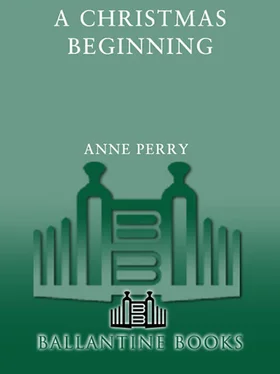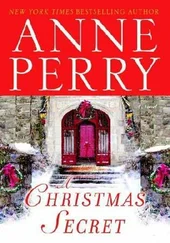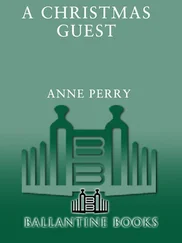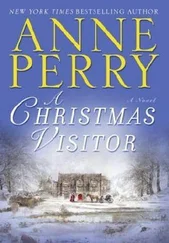
In the morning Runcorn rose early and ate the rich breakfast Mrs. Owen cooked for him. She seemed to enjoy filling the plate to overflowing with bacon, eggs, and potato cakes, then watching him make his way through it. He did not really want so much, and initially he ate it only to satisfy her sense of hospitality. But in succeeding days, as he worked his way through the meal he had talked to her and learned with growing interest her opinions of various people in the village and involved in the case. Her perception was simple, but sometimes surprisingly acute.
“Just the right man for the vicarage here, Mr. Costain is,” she said. “Poor soul, his wife. Lonely I think. No children. Doesn’t know how to talk without really saying anything, if you know what I mean? People don’t always want to think. Like Miss Olivia, she was.”
Runcorn had his mouth full and was unable to ask her to explain further, and he worried that if he did, she might think that perhaps she had said too much, and be more discreet in the future.
“Like some more tea, Mr. Runcorn?” she offered, the pot in her hand.
“Helps a lot of things, from a headache to a broken heart. Lovely girl, Miss Olivia was. Quick to sorrow, and quick to joy, God rest her. Never found anyone for herself, that I know of, in spite of what they said.”
Runcorn swallowed his mouthful whole and nearly choked himself. “What did they say?” he asked huskily, reaching for the tea to wash it down.
“Just silly gossip,” she replied. “Nothing to it. Would you like another piece of toast, Mr. Runcorn?”
He declined, finished his tea, and set out to look for Kelsall. This time he found the curate in the church, tidying up.
“Do you know something new?” he asked, striding towards Runcorn, black cassock swinging.
Runcorn felt a twinge of failure, as if he should have done better. “Not yet.”
“Perhaps if we leave, we will not be interrupted,” Kelsall suggested. “Here I am always ‘on duty,’ as it were. It’s cold outside, but at least it’s not raining.” He suited his actions to the words without waiting to see if Runcorn agreed. In the graveyard he matched his steps to Runcorn’s and guided their way out of the gate and onto a road leading out of the village towards the open hillside.
“Why do people kill others, Mr. Runcorn?” he asked. “I have been thinking of it all night. If any man knows, it is surely you. It is such a … a barbarous and futile way to solve anything.”
Runcorn looked at his earnest face and knew that the question was perfectly serious. Perhaps it was one he should have asked himself in more detail days ago. “Several reasons,” he said thoughtfully. “Sometimes it is greed, for money, for power, for property such as a house. Sometimes for something as trivial as an ornament or a piece of jewelry.”
“Not Olivia,” Kelsall said with certainty. “She had no possessions of any note. She was entirely dependent on her brother.”
“Ambition,” Runcorn continued. “It can drive people to violence, or betrayal.”
“Olivia’s death helps no one,” Kelsall responded. “Anyway, there is nothing around here to aspire to. It is all predictable, small offices, of no great power.”
Runcorn turned over all the past cases he could think of, particularly those of passion. “Jealousy,” he said grimly. “She was beautiful, and from what people say, she had a quality unlike anyone else, a fire and a courage different from others of her age and position. That can also make people feel uncomfortable, even threatened. People can kill out of fear.”
Kelsall walked on in silence. “What kind of fear?” he said at last.
Runcorn heard the change in his voice and knew that suddenly they were treading delicately, on the edge of truth. He must act slowly, he might be about to rip the veil from a pain that the young man had been keeping well covered.
“All kinds,” he said, watching Kelsall’s face in profile, his eyes and the lines of his mouth half hidden. “Sometimes it is of physical pain, but more often it is fear of loss.”
“Loss,” Kelsall tasted the word carefully. “What sort of loss?”
Runcorn did not answer, hoping Kelsall would suggest something himself.
They walked another fifty paces. The wind was easing off, although the clouds were low and dark to the east.
“You mean fear of scandal?” Kelsall asked. “Or ridicule?”
“Certainly. Many victims of blackmail have killed their tormentors.” Was this what had happened? Perhaps Olivia had learned a secret that somebody was afraid she would use against them. He looked at Kelsall as closely as he dared, but he could see no change in the curate’s expression. He still looked hurt and confused.
There was no sound but the wind in the grass and, far away, the echo of waves breaking on the rocks.
“Olivia wasn’t like that,” Kelsall said finally. “She would never repeat anyone’s secrets, still less would she use them. What for? The things she wanted could not be bought.”
“What did she want?”
“Freedom,” he said without hesitating to think. “She wanted to be herself, not the person convention said she should be. Perhaps we all want it, or think we do, but few of us are prepared to pay the price. It hurts to be different.” He stopped and faced Runcorn. “Is that why she was murdered, because she made other people aware of how ordinary they were, how easily they denied their dreams?”
“I doubt it,” Runcorn said gently. “Wouldn’t someone able to see that quality in her also know that killing her would make no difference whatever to their own … futility?”
“Not if she laughed at them,” Kelsall replied. “Some people cannot bear to be mocked. Ridicule can hurt beyond some people’s power to bear, Mr. Runcorn. It strikes the very core of who you believe yourself to be. One can forgive many things, but not being made to see yourself as ridiculous, a coward at life. That kind of rage is acid in the soul.”
Was he speaking of himself? Runcorn almost wondered for a moment if he was on the brink of hearing a confession. It would hurt. He genuinely liked the young man. He had seen his gentleness with the frail and old, help given as a privilege, not a duty.
“What do you know, Mr. Kelsall?” he asked. “I think it is time you spoke the truth.”
“I know that Newbridge and Barclay were at daggers drawn over her, but I don’t know if either of them really even wanted her, or simply hated each other because the battle was public. Some people do not take to losing with grace.”
Runcorn struggled to follow. “If that were so, would they not kill each other, rather than her?”
Kelsall shrugged, and started walking again. “I suppose so. Or even Faraday. Although it’s a bit late for that now.”
“The chief constable?” Runcorn caught up with him. “What has he to do with it?”
“Oh, he courted her too, a while ago,” Kelsall replied. “The poor vicar thought that would have been an excellent match, even though he was quite a few years older than she. He thought it would settle her down a bit. But she gave him no encouragement at all, and he soon grew tired of it.”
“Faraday?” the word burst from Runcorn in amazement, and a kind of dull and momentary anger. He had courted Olivia, and now he was going to marry Melisande. Olivia had refused him. And Melisande had been obliged to accept him.
Runcorn was being ridiculous, he knew it, and still his thoughts raced on. He might have lost interest in Olivia because she was flighty, a dreamer, irresponsible. He might love Melisande because she was gentler, a visionary still capable of loving the real, the human and fallible. A woman not only beautiful but brave enough to accept an ordinary man, and perhaps in time make of him something greater.
Читать дальше











